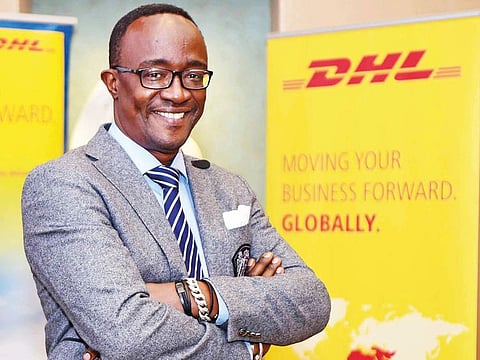DHL CEO lays out argument for Dubai’s future as logistics hub
Demographic shifts, growth of African middle class will ensure growth in local industry

Dubai: The regional boss of the world’s largest logistics firm said that Dubai’s position as a hub for shipping and air freight was unlikely to be diminished by local competitors in the coming years.
DHL Global Forwarding’s chief executive for the Middle East and Africa, Amadou Diallo, said that with a growing number of people in the region emerging out of poverty, the serviceable consumer market was growing rapidly.
Demographically, he argued, the Middle East was ripe for growth in the coming years, all of which would benefit Dubai as a nodal centre for logistics, trade, and commerce.
“I don’t see the hubs that are being created [around the region] as being a threat to Dubai,” Diallo told Gulf News, “I think it is just going to enable Dubai to service many more people.”
The number of middle income earners in Africa, which is serviced by the Middle East market from a logistics perspective, has increased from 140 million in 2008 to 420 million today.
“The aspiration of all these countries is to get most of the people out of poverty, so you will have a lot of consumers to service in Africa,” he added.
Locally, Diallo said, economic diversification efforts in the Gulf region, and population dynamics, would ensure growth in the future.
“You hear a lot of the countries like Saudi saying they need to become more and more independent from oil,” Diallo told Gulf News, “that means they move into manufacturing and industrialisation, which creates a lot of jobs.”
Competition no threat to Dubai as logistics hubDHL exec
These jobs would, in turn, create wealth, and therefore demand.
“Therefore you have many more consumers to service, so I don’t see it as a threat, I see it as an enabler for many more people to have access to goods.”
Diallo went on to say that the Gulf’s native population was increasingly entering the workforce thanks to gender equality efforts.
Consumption was increasing because the region’s young population was looking at “working more, and being inclusive with the diversity programme … so that all the female population will also be included in the economy,” he said. “So you’ll have more consumers.”
This would also lead to a greater inflow of foreign workers, as the local populations wouldn’t be able to satisfy the demand by themselves, Diallo argued.
“All of this will contribute to less people living in poverty, and more people consuming and working … that’s why I don’t think it’s a threat [to Dubai].”
“That’s my reasoning,” he added.



